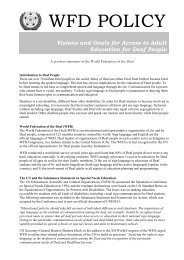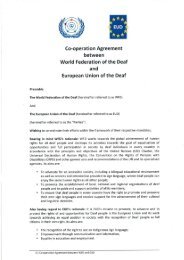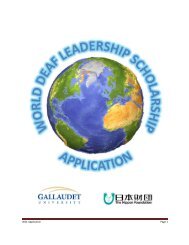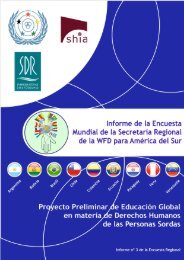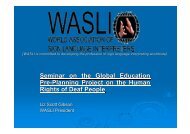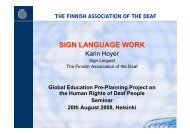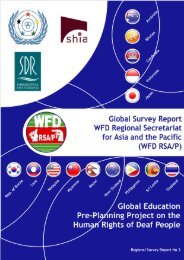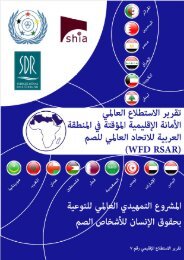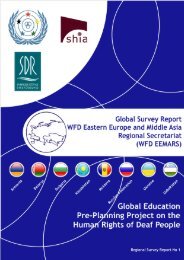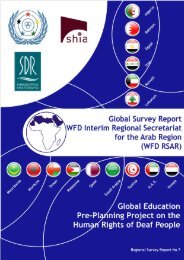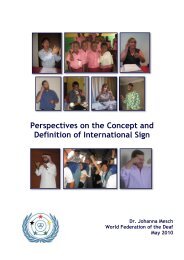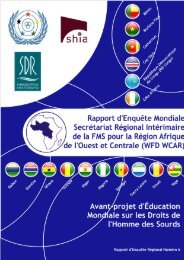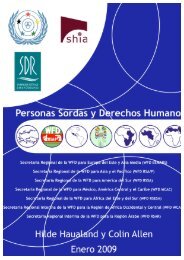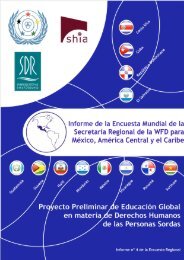Page No 1 - World Federation of the Deaf
Page No 1 - World Federation of the Deaf
Page No 1 - World Federation of the Deaf
You also want an ePaper? Increase the reach of your titles
YUMPU automatically turns print PDFs into web optimized ePapers that Google loves.
5.0 Recommendations<br />
This section is based on <strong>the</strong> recommendations prepared by <strong>the</strong> members <strong>of</strong> <strong>the</strong> Regional Working Group that met in San Jose,<br />
Costa Rica, on 25 th – 27th March, 2008 to pursue <strong>the</strong> issues highlighted in <strong>the</strong> report. The current economic situation in <strong>the</strong><br />
WFD MCAC region, especially for <strong>the</strong> countries categorised under <strong>the</strong> <strong>World</strong> Bank Classification as Low Income or Low Middle<br />
Income (Cuba, El Salvador, Guatemala, Guyana, Haiti, Honduras, Nicaragua and Suriname), has an impact on any <strong>of</strong> <strong>the</strong>ir<br />
governments’ abilities to fund programmes to support <strong>the</strong>se initiatives.<br />
It may be necessary for <strong>the</strong> <strong>World</strong> <strong>Federation</strong> <strong>of</strong> <strong>the</strong> <strong>Deaf</strong> (WFD) and Swedish National Association <strong>of</strong> <strong>the</strong> <strong>Deaf</strong> (SDR) to seek<br />
external support for <strong>the</strong> region, i.e. to seek project support and funding via partnerships with Shia and o<strong>the</strong>r relevant<br />
organisations.<br />
The Regional Working Group brainstormed about issues brought to light by <strong>the</strong> survey as urgent needs for <strong>the</strong> members in<br />
Mexico, Central America and <strong>the</strong> Caribbean. From this <strong>the</strong>y identified training needs for <strong>the</strong> region.<br />
The Regional Working Group recommended that any and all training should be available in sign language and conducted by<br />
<strong>Deaf</strong> Trainers and Experts. The Regional Working Group has identified <strong>the</strong> major needs as being:<br />
5.1 Increase Knowledge <strong>of</strong> <strong>the</strong> United Nations Conventions<br />
After receiving training on <strong>the</strong> various conventions <strong>of</strong> <strong>the</strong> United Nations, <strong>the</strong> Regional Working Group considered knowledge<br />
<strong>of</strong> current conventions a powerful tool for each country’s <strong>Deaf</strong> Community. Training should be provided about <strong>the</strong>:<br />
• Universal Declaration <strong>of</strong> Human Rights<br />
• International Covenant on Economic, Social and Cultural Rights<br />
• International Covenant on Civil and Political Rights<br />
• Convention on <strong>the</strong> Rights <strong>of</strong> <strong>the</strong> Child<br />
• Convention on <strong>the</strong> Elimination <strong>of</strong> all Forms <strong>of</strong> Discrimination Against Women<br />
• Periodic reporting, <strong>the</strong> new system <strong>of</strong> Universal Periodic Reviews and also shadow/alternative reports from NGOs<br />
5.2 Training on <strong>the</strong> United Nations Convention on <strong>the</strong> Rights <strong>of</strong> Persons with Disabilities (CRPD)<br />
In <strong>the</strong> region, five out <strong>of</strong> 12 governments have ratified <strong>the</strong> Convention. Ideally each member <strong>of</strong> WFD MCAC should receive full<br />
training in understanding <strong>the</strong> CRPD in its entirety, to enable <strong>the</strong>m to prepare for <strong>the</strong>ir advocacy role within areas such as:<br />
1. How to lobby Government to sign and ratify CRPD (who, how, what)<br />
2. How <strong>the</strong> National Association <strong>of</strong> <strong>the</strong> <strong>Deaf</strong> can become an expert with <strong>the</strong>ir national government for <strong>the</strong> five articles<br />
<strong>of</strong> <strong>the</strong> CRPD specifically related to <strong>the</strong> <strong>Deaf</strong> Community<br />
3. How to prepare and advise <strong>the</strong> national government about <strong>the</strong> five articles <strong>of</strong> <strong>the</strong> CRPD relating to <strong>the</strong> <strong>Deaf</strong><br />
Community including budget preparation, advisory roles, and appropriate systems/appointments/procedures<br />
5.3 Training for <strong>the</strong> National Association <strong>of</strong> <strong>the</strong> <strong>Deaf</strong> and <strong>Deaf</strong> Groups/Organisations<br />
The process would ideally also include training <strong>of</strong> individual members and board members <strong>of</strong> every National Association <strong>of</strong> <strong>the</strong><br />
<strong>Deaf</strong> and <strong>Deaf</strong> Group/Organisation in <strong>the</strong> region <strong>of</strong> WFD MCAC, and include subjects such as:<br />
• WFD Policies<br />
• International Network and Roles <strong>of</strong> <strong>the</strong> United Nations, WFD, WFD Regional Secretariats<br />
• Global Models <strong>of</strong> <strong>Deaf</strong> Communities and Organisations, e.g. WFD, and <strong>the</strong>ir work<br />
• Human Rights<br />
• Gender Issues<br />
• <strong>Deaf</strong> Education/Bilingualism for <strong>Deaf</strong> Students<br />
• Review <strong>of</strong> <strong>Deaf</strong> Education<br />
• Sign Language Work<br />
• Sign Language Interpreting<br />
• Media for <strong>Deaf</strong> People<br />
• <strong>Deaf</strong> Employment/Vocational Training<br />
• National Legislation/Local Government Systems<br />
• Leadership<br />
• Empowerment and Democracy<br />
• Advocacy by <strong>the</strong> National Association <strong>of</strong> <strong>the</strong> <strong>Deaf</strong><br />
• <strong>Deaf</strong>hood (<strong>the</strong> <strong>Deaf</strong> collective existence; a process by which <strong>Deaf</strong> individuals come to actualise <strong>the</strong>ir <strong>Deaf</strong> identity)<br />
• Mental Health<br />
• HIV and AIDS Awareness<br />
• <strong>Deaf</strong> Employment<br />
• Self Esteem/Self Confidence<br />
This training will endeavour to provide empowerment and self-reliance to <strong>the</strong> National Association <strong>of</strong> <strong>the</strong> <strong>Deaf</strong> and <strong>Deaf</strong><br />
Groups/Organisations as <strong>the</strong>y act in accordance with <strong>the</strong>ir obligations to advocate and improve <strong>the</strong> status <strong>of</strong> <strong>the</strong> <strong>Deaf</strong><br />
community in <strong>the</strong>ir country.<br />
The Project was under <strong>the</strong> auspices <strong>of</strong> <strong>the</strong> Swedish National Association <strong>of</strong> <strong>the</strong> <strong>Deaf</strong> (SDR) and <strong>the</strong> <strong>World</strong> <strong>Federation</strong> <strong>of</strong> <strong>the</strong> <strong>Deaf</strong> (WFD), <strong>Page</strong> <strong>No</strong> 25<br />
and funded by <strong>the</strong> Swedish Agency for International Development Cooperation (Sida) and Swedish Organisations’ <strong>of</strong> Disabled Persons<br />
International Aid Association (Shia).



